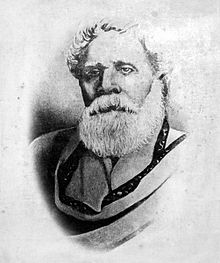
Back রাজনারায়ণ বসু Bengali/Bangla राजनारायण बसु Hindi राजनारायण बासू Marathi راج ناراین باسو PNB இராஜ்நாராயண பாசு Tamil రాజనారాయణ బసు Tegulu راج ناراین باسو Urdu
This article needs additional citations for verification. (August 2022) |
Rajnarayan Basu | |
|---|---|
 Rajnarayan Basu, c. 1899 | |
| Born | 7 September 1826 Boral, 24 Parganas, Bengal Presidency, British India (present-day South 24 Parganas, West Bengal, India)[1] |
| Died | 18 September 1899 Midnapore, Bengal Presidency, British India (present-day West Bengal, India) |
| Nationality | Indian |
| Other names | Rishi Rajnarayan Basu Rajnaryan Bose |
| Education | Hare School |
| Occupation | Writer |
| Spouses |
|
| Children | 1 |
| Relatives | Sri Aurobindo (grandson) |
Rajnarayan Basu (1826–1899) was an Indian writer and intellectual of the Bengal Renaissance. He was born in Boral in 24 Parganas and studied at the Hare School and Hindu College, in Kolkata, Bengal. A monotheist at heart, Basu converted to the Brahmoism sect at the age of twenty.[2][3] After retiring, he was given the honorary title of Rishi or sage. As a writer, he was one of the best known prose writers in Bengali in the nineteenth century, writing often for the Tattwabodhini Patrika, a premier Brahmo journal.[4] Due to his defence of Brahmoism, he was given the title "Grandfather of Indian Nationalism".[5][6]
- ^ Rajnarayan Basur Atmacharit, Basu, Rajnarayan, Kuntaline Press, 1909, p. 1
- ^ Murshid, Ghulam (2012). "Basu, Rajnarayan". In Islam, Sirajul; Jamal, Ahmed A. (eds.). Banglapedia: National Encyclopedia of Bangladesh (Second ed.). Asiatic Society of Bangladesh.
- ^ "রাজনারায়ণ বসু". সববাংলায় (in Bengali). 4 September 2022. Retrieved 14 September 2022.
- ^ Devnath, Samaresh (2012). "Tattvabodhini Patrika". In Islam, Sirajul; Jamal, Ahmed A. (eds.). Banglapedia: National Encyclopedia of Bangladesh (Second ed.). Asiatic Society of Bangladesh.
- ^ Kopf, David (1979). The Brahmo Samaj and the Shaping of the Modern Indian Mind. Atlantic Publishers & Distri. ISBN 978-0-691-03125-5.
- ^ Gupta, Prakash Chandra (1968). Prem Chand. Sahitya Akademi. ISBN 978-81-260-0428-7.